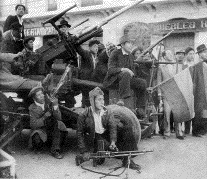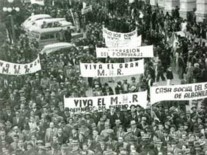9 de abril
04.09.2003Today marks the anniversary of Bolivia's April Revolution. The celebrations will be subdued this year. Most Bolivian papers carry the Iraq war on their front pages. And Goni's MNR government is in serious political trouble these past few months. Last year was the 50th anniversary; I suppose 51 isn't that big a deal.
But there's no mistaking the Revolution's impact on the country. Victorious in the 1951 general election — even though suffrage at that time was limited to only Spanish-speaking, literate, males — the National Revolutionary Movement (MNR) was prevented from taking office by the military. Víctor Paz Estenssoro, the MNR leader, went into exile.
 On an early morning, 9 April 1952, small groups of organized, clandestine, civilian militias took to the streets of La Paz and other major cities. Denied a political solution, it was time to use force. They quickly captured some heavier military equipment (like this anti-aircraft gun) and hastily built barricades. They waited for the army's onslaught.
On an early morning, 9 April 1952, small groups of organized, clandestine, civilian militias took to the streets of La Paz and other major cities. Denied a political solution, it was time to use force. They quickly captured some heavier military equipment (like this anti-aircraft gun) and hastily built barricades. They waited for the army's onslaught.
From the main army barracks, an artillery regiment shelled popular neighborhoods. The police, which was to join the uprising, bowed out — a blow to the emenerristas. By nightfall, street fighting was intense. Hernán Siles Zuazo managed to establish a makeshift headquarters in the national soccer stadium (now named in his honor).
Just as it looked like the uprising would fail, cries of "¡Los mineros! ¡Los Mineros!" filtered through the barricades. The miners had arrived. Organized into their own militias, these hard men of the Andean mountain rock had seized the trains. In Sucre. In Potosí. In Oruro. They piled into the box cars and on the roofs - and rode through the night.
 The victory marches were gigantic. Miners' militias in their dust-covered coveralls and heavy helmets. Aymaran peasant militias in their colorful ponchos and worn sandals. The women's militas, their black hair in precise buns as they marched in their baggy pants. Although the military came back to power in 1964, most of the MNR's victories remained. The mining industry nationalized. Agrarian reform. Aymara and Quechua recognized as official languages. Universal suffrage — for women, workers, peasants.
The victory marches were gigantic. Miners' militias in their dust-covered coveralls and heavy helmets. Aymaran peasant militias in their colorful ponchos and worn sandals. The women's militas, their black hair in precise buns as they marched in their baggy pants. Although the military came back to power in 1964, most of the MNR's victories remained. The mining industry nationalized. Agrarian reform. Aymara and Quechua recognized as official languages. Universal suffrage — for women, workers, peasants.
A few years ago, I attended the funeral of Ñuflo Chavez Ortiz, an MNR founder and director of the agrarian reform. He died, in his unassuming little house in Santa Cruz. The procession crowded the central plaza, winding towards the cathedral. I stood on the steps, left of the main door. A sea of politicians and simple people mixed together. Led by a dozen huge pink MNR flags.
Posted by Miguel at 01:09 PM